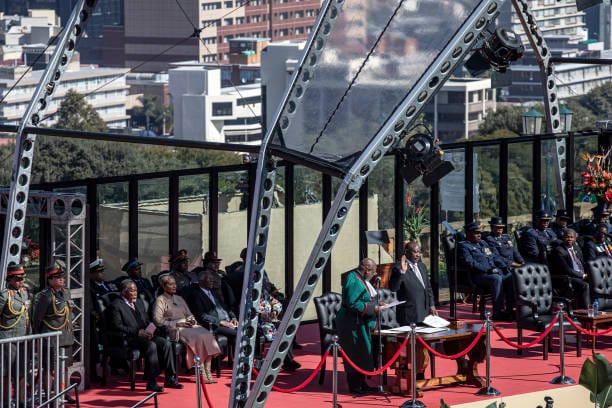In Summary
- President Cyril Ramaphosa inaugurated for a second term following a closely contested election.
- Ramaphosa received a 21-gun salute and military honors during the inauguration.
- For the first time since the end of apartheid, the ANC did not secure a parliamentary majority, facing stronger opposition from other parties.
- Ramaphosa defeated Julius Malema with 283 votes to 44 in the parliamentary vote.
- South Africa continues to struggle with high levels of unemployment, inequality, and violent crime.
DETAILS
Pretoria, South Africa– In a grand ceremony filled with military honors, President Cyril Ramaphosa was sworn in for his second term on Wednesday, following a tightly contested election last month. The day was marked by a 21-gun salute and a parade, celebrating Ramaphosa’s continued leadership.
Securing his position with majority support in parliament, Ramaphosa’s victory was backed by members of his own African National Congress (ANC), as well as the Democratic Alliance (DA) and other smaller parties. This support came despite the ANC’s historic failure to secure a parliamentary majority on its own in the May 29 election, a significant shift in South Africa’s political landscape since the end of apartheid.
The ANC, once led by Nelson Mandela and a dominant force since 1994, garnered only 40% of the national vote, its support eroded by growing public frustration over economic disparities and governance issues. The DA, which is seen as more centrist and business-oriented, secured 21% of the vote, reflecting a diversification of political power.
Ramaphosa’s main opponent, Julius Malema of the Economic Freedom Fighters, a far-left party, received only 44 votes against Ramaphosa’s 283 in the 400-member parliament. This vote underlined the still-prevalent support for Ramaphosa’s leadership, despite the broader challenges facing the ANC.
South Africa remains troubled by some of the world’s highest levels of unemployment, inequality, and violent crime, issues that the Ramaphosa administration will need to address more effectively in this term. The collaboration or tension between the ANC’s liberation movement legacy and the DA’s business-friendly policies may define the next phase of governance.
As Ramaphosa steps into his second mandate, the complexity of South Africa’s political alliances and the pressing socio-economic issues present a challenging road ahead, one that will require significant political skill and dedication to navigate.
https://www.africanexponent.com/cyril-ramaphosa-swon-in-as-south-africas-president/


